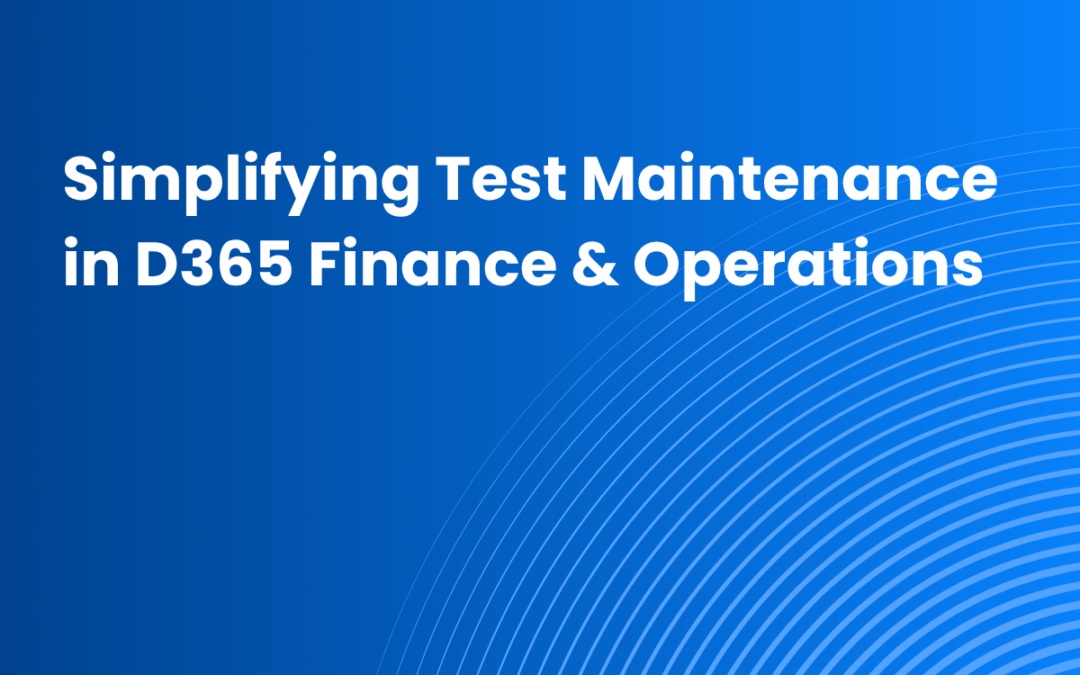Smart Test Automation Strategies for Microsoft D365
Imagine your company has just invested in a test automation platform for Microsoft Dynamics 365 (D365). You’re eager to leverage automation to enhance your testing efforts and ensure high-quality results. With a vast array of modules and processes within D365, however, it can be overwhelming to determine where automation should be applied for testing purposes.
This blog will help you identify the best areas within D365 to prioritize for automated testing, ensuring a smooth setup and maximizing the efficiency of your test automation strategy.
What Makes a Good Candidate for Automated Testing in Microsoft D365?
Before diving into automation, it’s crucial to identify which areas of testing within D365 offer the most value when automated. Certain types of tests, processes, and workflows are more suited for automation, enabling you to maximize testing efficiency and accuracy while reducing manual effort.
Repetitive and Time-Consuming Tests
Automated testing is ideal for processes that are run repeatedly, such as regression tests, smoke tests, and data-driven tests. These tests are frequently executed after each new D365 release, making them the perfect candidates for automation.
By automating these tests, you reduce the time spent on repetitive tasks, minimize human error, and ensure consistency across test cycles.
High-Risk and Critical Business Functions
Testing the core business functions that are critical to your organization is essential. This includes areas such as financial transactions, order processing, and inventory management.
Automated testing in these areas ensures that any issues are identified quickly, reducing the risk of operational disruptions and ensuring a stable environment for your business processes.
Stable and Predictable Functionalities
It’s beneficial to automate testing for functions within D365 that are unlikely to change frequently. For instance, testing for financial compliance or accounting processes can be automated because they are stable over time.
Automating these tests reduces maintenance efforts and keeps your test suite effective longer without requiring frequent updates.
Data-Intensive Workflows
D365 handles large volumes of data, making it important to test data consistency, integrity, and accuracy across various modules.
Automated testing can be applied to data validation, integration testing, and data migration tests, ensuring that data flows properly between modules and that critical data points remain accurate.
D365 Areas to Prioritize for Automated Testing
To maximize the benefits of your test automation tool, it’s crucial to focus on testing the areas of D365 that have the greatest business impact and are most conducive to automation. Below are the core areas of D365 to prioritize for automated testing:
1. D365 Finance
- Financial Transaction Testing – Automate the testing of transactions like invoicing, payment processing, and general ledger entries to ensure accuracy and compliance.
- Accounts Payable & Receivable Testing – Automate the verification of transactions, including invoice matching and payment schedules, to reduce errors and improve efficiency.
- Tax Compliance Testing – Automate tax calculations and reporting processes to ensure compliance with regional and international tax regulations.
2. D365 Supply Chain Management
- Inventory Management Testing – Automate tests to verify stock levels, order fulfillment, and inventory tracking to ensure smooth supply chain operations and prevent discrepancies.
- Procurement Testing – Automate the testing of purchasing workflows, including vendor selection, order creation, and supplier communications, to improve the efficiency of procurement processes.
- Logistics & Delivery Testing – Ensure automated testing of logistics processes, such as order tracking and shipping updates, to improve delivery reliability and customer satisfaction.
3. D365 Sales & Customer Service
- Order Management Testing – Automate the verification of order entry, invoicing, and fulfillment notifications to reduce errors and speed up order processing.
- Customer Interaction Testing – Automate the testing of case management, service requests, and customer communication workflows to improve responsiveness and support quality.
- Sales Process Testing – Automate tests for lead management, opportunity tracking, and sales forecasts to improve sales pipeline accuracy and team productivity.
4. D365 Integration & API Testing
- Third-Party Integrations – Automate testing for integrations between D365 and other enterprise systems, such as CRM tools or external databases, to ensure seamless communication and prevent data discrepancies.
- API Testing – Automate the testing of APIs to ensure the proper flow of data between D365 and external systems, minimizing the risk of integration failures.
Developing a Sustainable Test Automation Strategy for D365
Once you have selected your test automation candidates, it’s essential to develop a sustainable strategy for long-term success. A well-planned strategy ensures your automation efforts remain effective and scalable as your D365 environment evolves.
Test Prioritization
When developing your automation strategy, prioritize the tests based on their business impact. High-risk tests, such as those in Finance and Supply Chain Management, should be automated first. By focusing on critical workflows and frequent tests, you ensure the most valuable processes are covered while minimizing potential errors that could disrupt business operations.
Ongoing Maintenance and Governance
Automation isn’t a one-time project—it requires ongoing maintenance. D365 regularly updates its features, which may result in changes to workflows and processes. Ensure you have a governance strategy in place to update and adapt your automated tests as D365 evolves, minimizing the need for constant manual intervention.
Collaboration Between IT & Business Teams
Test automation in D365 should be a collaborative effort between IT teams and business units. Business users understand the core workflows that are crucial to the organization, while IT can ensure the technical side of test automation is implemented efficiently. This collaboration ensures that automation is aligned with the actual business needs and objectives.
Manual vs. Automated Testing – Where to Draw the Line
While automation brings numerous benefits, it’s important to understand that not all testing should be automated. Certain types of tests require human insight and judgment and are better left for manual testing.
Tests Best Left for Manual Execution
- Exploratory Testing – These tests are conducted without pre-defined scripts and require creativity and human judgment. Automated tests cannot mimic this approach, so it’s important to perform this type of testing manually.
- Usability Testing – Evaluating the user experience and interface requires subjective human feedback and is best performed manually.
- Ad-Hoc Testing – These are one-off tests that do not occur regularly, making them less suited for automation.
- Localization Testing – Verifying translations and regional settings often involves cultural nuances and is better handled manually.
Why Identifying Test Automation Candidates is Important
Prioritizing which tests to automate is essential to maximizing the return on investment (ROI) from your test automation tool. By focusing on high-impact, repetitive, and stable tests, you ensure that your efforts are directed toward the areas that will provide the greatest benefit. This also helps prevent unnecessary maintenance costs associated with automating tests that are infrequently used or subject to constant change.
Conclusion
Automating tests within Microsoft D365 helps improve the efficiency, accuracy, and reliability of your ERP testing efforts. By focusing on high-impact modules such as Finance, Supply Chain Management, and Sales & Customer Service, you can ensure that your automated testing efforts are aligned with your organization’s most critical workflows.
Remember, automation is a powerful tool, but manual testing still plays an important role in areas where human creativity and judgment are required. By identifying the right candidates for automation and continuously maintaining your automation suite, you can build a robust and efficient testing process that scales with your organization.
Ready to streamline your D365 testing? With TheTestMart, you can automate high-impact areas quickly and effectively, ensuring smoother releases and better quality assurance. Get in touch today and see how our platform can simplify your test automation strategy!





